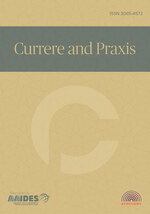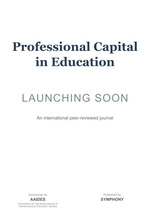Competency based curriculum in Kenya: Taking stock of implementation process at early years education
DOI:
https://doi.org/10.70116/2980274199Keywords:
Competency based curriculum, early years education, implementation, KenyaAbstract
This paper argues that the government implemented Competency Based Curriculum (CBC) with the aim of nurturing global learning competencies into learners. However, the quest faced many challenges at the Early Years Education (EYE) level. Such scenario was going to have a negative implication on producing learners with envisaged competencies. The purpose of this study therefore, was to investigate the gaps that existed in the designed curriculum framework and the actual practice during implementation process. The study adopted descriptive survey design method. Purposive sampling and simple random sampling were employed to select participants. Interview schedules, document analysis and structured observations schedules were utilized to collect data. Quantitative data was analyzed by use of frequencies, percentages, means, pie charts and bar graphs while qualitative data was analyzed thematically and reported inform of quotations and narrations. It was established that gaps existed in the stated curriculum framework designed and the actual practice during implementation. The study concluded that teachers’ we’re not sufficiently retooled on pedagogy and assessment, making their understanding on curriculum implementation vague. There was acute shortage of infrastructure especially digital devices and internet connectivity, undermining the attainment of digital literacy competency. Stakeholders were not adequately sensitized on the rationale for the curriculum reforms before roll out making them sceptical, uncertain and doubtful. It recommended retooling of teachers, funding to be backed by a coherent policy which prioritizes the provision of infrastructure, teaching and learning resources and sensitization process to involve all stakeholders working to implement the reform in shared sense-making.
Downloads
References
Akala, B. M. (2020). Revisiting education reforms in Kenya: A case of Competency-Based Curriculum. Elsevier, 1–8. https://doi.org/10.1016/j.ssaho.2021.100137 DOI: https://doi.org/10.1016/j.ssaho.2021.100137
Akimi, Y. (2014). From global advocacy to local resistance: Benin’s experience of Competency-Based School Curriculum. ZEP, 37, 14–21. https://doi.org/10.25656/01:12091
Akinrinola, F. T., Ogegbo, A., Emmanuel, L., & Adewusi, A. (2020). Competency-Based Education in Africa: Exploring teachers’ perceptions, understanding, and practices. Teacher Education Through Flexible Learning in Africa, 1–24. https://doi.org/10.355293/telfle.v2il.85
Ambei, M. C., Kum, I., & Ambei, R. (2020). The Competency-Based Curriculum implementation: Appraisal from the perspective of teachers’ use of resources. International Journal of Trend in Scientific Research and Development, 2(4), 2278–2288. DOI: https://doi.org/10.31142/ijtsrd15646
Amin, M. A. (2005). Social research: Conception, methodology and analysis. Makerere University Press.
Amunga, J., Were, D., & Ashioya, I. (2020). The teacher-parent nexus in the Competency-Based Curriculum success equation in Kenya. International Journal of Educational Administration and Policy Studies, 12(1), 60–76. https://doi.org/10.5897/IJEAPS2020.0646 DOI: https://doi.org/10.5897/IJEAPS2020.0646
Amutabi, M. N. (2019). Competency-Based Curriculum (CBC) and the end of an era in Kenya’s education sector and implications for development: Some empirical reflections. Journal of Popular Education in Africa, 3(10), 45–66.
Andiema, N. C. (2020). Teachers’ competencies in evaluation of Competency-Based Curriculum among special needs learners in Kenya. Global Journal of Educational Research, 19(2), 135–145. https://doi.org/10.4314/gjedr.v19i2.2 DOI: https://doi.org/10.4314/gjedr.v19i2.2
Catacutan, A., Kilag, O., Diano, F., Tiongzon, B., Malbas, M., & Abendan, C. (2023). Competence-based curriculum development in a globalized education landscape. Excellencia International Multi-Disciplinary Journal of Education, 1(4), 270-282.
Chen, Y. (2023). The relevance of Dewey’s educational theory to ‘teaching and learning in the 21st century’. Paradigm Academic Press Studies in Social Science & Humanities, 2(4). https://doi.org/10.56397/SSSH.2023.04.06 DOI: https://doi.org/10.56397/SSSH.2023.04.06
Cheptoo, R., & Ramdas, V. (2020). Competency-Based Curriculum in Kenya: A critique. International Journal of Creative Research Thoughts, 8(6), 3206–3213.
Cohen, L., Manion, L., & Morrison, K. (2007). Research methods in education (6th ed.). Taylor and Francis Group. DOI: https://doi.org/10.4324/9780203029053
Deng, Z., Gopinathan, S., & Lee, C. K. E. (2013). The Singapore curriculum: Convergence, divergence, issues and challenges. In Globalization and the Singapore Curriculum: From Policy to Classroom (pp. 15). Springer. https://doi.org/10.1007/978-981-4451-57-4_15 DOI: https://doi.org/10.1007/978-981-4451-57-4_15
Gunawan, I. (2017). Indonesian Curriculum 2013: Instructional management, obstacles faced by teachers in implementation, and the way forward. Advances in Social Science, Education and Humanities Research, 56–63. DOI: https://doi.org/10.2991/icet-17.2017.9
Hayat, A. W., & Adiyono, A. (2025). Innovative strategies for developing competency-based learning evaluation in Madrasah Ibtidaiyah under the independent curriculum. Journal of Elementary Education Research and Practice, 1(1), 49–62. DOI: https://doi.org/10.70376/h7egb189
Iwikotan, K. (2021). Testing in a competency-based language teaching context. European Journal of English Language Teaching, 6(1), 63–75. https://doi.org/10.46827/ejel.v6i6.3947 DOI: https://doi.org/10.46827/ejel.v6i6.3947
Kabombwe, M., & Mulenga, M. (2019). Implementation of competency-based curriculum in schools in Lusaka District, Zambia. Yesterday and Today, 22, 19–41. https://doi.org/10.17159/2223-0386/2019/n22az DOI: https://doi.org/10.17159/2223-0386/2019/n22a2
Kabombwe, N. M., Machila, N., & Sikayomya, P. (2020). Implementing a history competence-based curriculum: Teaching and learning activities for a Zambian school history classroom. Multidisciplinary Journal of Language and Social Sciences Education, 3(3), 18–50.
Kafyulilo, A. C., Rugambuka, I. B., & Ikupa, M. (2013). Implementation of competency-based teaching in Morogoro Teachers’ Training College, Tanzania. Makerere Journal of Higher Education, 4(2), 311–326. https://doi.org/10.4314/majohe.v4i2.13 DOI: https://doi.org/10.4314/majohe.v4i2.13
Karamugire, C., Yadav, L., & Mbonyiryivuze, A. (2019). Tutors’ perceptions about science curriculum and challenges for their implementation in teacher training colleges in Rwanda. African Journal of Educational Studies in Mathematics and Sciences, 15(1), 101–116. DOI: https://doi.org/10.4314/ajesms.v15i1.9
Komba, S. C., & Mwandanji, M. (2015). Reflections on the implementation of competency-based curriculum in Tanzanian secondary schools. Journal of Education and Learning, 4(2), 73–80. https://doi.org/10.5539/jel.v42p73 DOI: https://doi.org/10.5539/jel.v4n2p73
Kombo, D. K., & Tromp, D. L. (2006). Proposal and thesis writing: An introduction. Paulines Publications Africa.
Kitasse, T., & Ssembatya, H. (2024). Analysis of the implementation of competency-based curriculum in the Luganda language classroom in selected secondary schools in Rubaga Division, Kampala District, Uganda. Journal of Research Innovation and Implications in Education, 8(2), 1–16. https://doi.org/10.59765/bytr2475 DOI: https://doi.org/10.59765/bytr2475
Kristiyani, C. (2019). Implementing the school curriculum in the framework of the 21st-century skills in Indonesian context. Social Science and Humanities Journal, 3(5), 1211–1221.
Kusaka, S. (2020). Issue analysis of competency-based mathematics curriculum design in African countries: A case study of Mozambique’s primary mathematics education. Journal of Education and Learning, 9(1), 41–50. https://doi.org/10.5539/jel.v9n1p41 DOI: https://doi.org/10.5539/jel.v9n1p41
Kyunghee, S. (2020). Whom is the national curriculum for? Politics in the national curriculum system of South Korea. In Fan, G., & Popkewitz, T. S. (Eds.), Handbook of education policy studies (pp. 271–291). Springer. https://doi.org/10.1007/978-981-13-8343-4_8
Lupeja, T., & Komba, S. (2021). Implementation of competency-based curriculum in the context of colonial education systems in Tanzania. International Journal of Research Studies in Education, 10(5), 33–43. https://doi.org/10.5861/ijrse.2021.5082 DOI: https://doi.org/10.5861/ijrse.2021.5082
Mavunga, R. (2016). Integrating competency-based assessment in secondary education: A case of Bulawayo Metropolitan Province in Zimbabwe. Journal of Education, 4(4), 1–10.
Mayne, H., & Raymond, A. D. (2020). The epistemological dilemma: Student teachers’ shared experiences of Jamaica’s national standards curriculum. Journal of Curriculum and Teaching, 9(4), 29–39. https://doi.org/10.5430/jct.v9n4p29 DOI: https://doi.org/10.5430/jct.v9n4p29
Mogga, J. L. (2018). South Sudan’s national curriculum framework (2014): A critique of change. Journal of Advances in Education and Philosophy, 2(4), 269–279.
Momanyi, M. J., & Rop, P. P. (2019). Teacher preparedness for the implementation of competency-based curriculum in Kenya: A survey of early grade primary school teachers in Bomet East Sub-County. The Cradle of Knowledge: African Journal of Educational and Social Science Research, 7(1), 10–15.
Monokore, K., & Chiwiye, T. (2021). Teachers’ assessment competencies: An imperative for the successful implementation of continuous assessment (CA) in the updated Zimbabwean school curriculum. In Machingura, F., & Hapanyengwi-Chemhuru, O. (Eds.), Curriculum framework (2015–2022) for sustainable development in Zimbabwe (pp. 113–134). Academic Research Centre.
Mufanechiya, A., & Mufanechiya, T. (2020). Selected primary school teachers’ perceptions of implementing the competency-based curriculum in Zimbabwe: Heartaches and opportunities. Journal of New Vision in Educational Research, 1(2), 407–422.
Muricho, W. P., & Chang’ach, J. K. (2013). Education reforms in Kenya for innovation. International Journal of Humanities and Social Science, 3(9), 123–145.
Muzembe, H., Machaba, M., & Modise, M. (2021). Implementing the updated early childhood development curriculum in Zimbabwean primary schools: Social validity based on practitioners’ views. Journal for the Education of Gifted Young Scientists, 9(1), 377–389. https://doi.org/10.17478/jegys.1011035 DOI: https://doi.org/10.17478/jegys.1011035
Namuyemba, C., Kipkenei, S., & Maiyo, J. (2021). Stakeholders’ preparedness of school teaching and learning resources to facilitate transition from 8-4-4 to competency-based curriculum in Bungoma. International Journal of Advanced Research, 9(1), 544–564. https://doi.org/10.21474/IJAR01/13774 DOI: https://doi.org/10.21474/IJAR01/13774
Ngaruiya, B. (2023). Competency-based curriculum and its implications for teacher training in Kenya. The Cradle of Knowledge: African Journal of Educational and Social Science Research, 11(1), 1–13. https://doi.org/10.4314/ajessr.v11i1.1 DOI: https://doi.org/10.4314/ajessr.v11i1.1
Nkya, H. E., Huang, F., & Mwakabungu, F. (2021). Implementation of competency-based curriculum in Tanzania: Perceptions, challenges and prospects. A case of secondary school teachers in Arusha Region. Journal of Education and Practice, 12(19), 34–41. https://doi.org/10.776/JEP/12-19-04
Nombo, U. (2022). Competency-based curriculum in the teachers’ colleges: The challenges. European Journal of Alternative Education Studies, 7(1), 56–71. https://doi.org/10.46827/ejae.v7i1.4179 DOI: https://doi.org/10.46827/ejae.v7i1.4179
Nsengimana, V. (2021). Implementation of competency-based curriculum in Rwanda: Opportunities and challenges. Rwandan Journal of Education, 5(1), 129–136.
Nzima, I. (2016). Competency-based curriculum in Tanzania: Tutors’ understanding and their instructional practices. [Doctoral dissertation, Linnaeus University, Sweden].
Orodho, J. A. (2009). Techniques of writing research proposal and reports in education and social sciences. Reata Printers.
Puad, L., & Ashton, K. (2022). A critical analysis of Indonesia’s 2013 national curriculum: Tensions between global and local concerns. Curriculum Journal, 33(1), 1–15. https://doi.org/10.1002/curj.194 DOI: https://doi.org/10.1002/curj.194
Republic of Kenya. (1976). Report of the National Committee of Educational Objectives and Policies. Government Printer.
Republic of Kenya. (1981). Second University in Kenya: Report of the Presidential Working Party. Government Printer.
Republic of Kenya. (1988). Education and manpower training for the next decade and beyond: Report of the Presidential Working Party. Government Printer.
Republic of Kenya. (1999). Totally integrated quality education and training: Report of the Commission of Inquiry into the Education System of Kenya. Government Printer.
Republic of Kenya. (2012). Task force on the re-alignment of the education sector to the constitution of Kenya 2010: Towards a globally competitive quality education for sustainable development. Government Printer.
Republic of Kenya. (2013). The Basic Education Act, No.14 of 2013. Government Printer.
Republic of Kenya. (2015). Sessional Paper No. 2 of 2015 on reforming education and training sector in Kenya. Ministry of Education and Ministry of Higher Education, Science and Technology.
Republic of Kenya. (2017). Basic Education Curriculum Framework. Kenya Institute of Curriculum Development.
Republic of Kenya. (2021). The Early Childhood Education Act, No. 3 of 2021. Government Printer.
Republic of Kenya. (2023). Transforming education, training, and research for sustainable development in Kenya: Report of the Presidential Working Party on Education Reform. Government Printer.
Rwigema, P., & Andala, H. (2022). The influence of teacher-related factors on the implementation of the competency-based curriculum in Rwanda: A case study of public primary schools in Kicukiro District. Strategic Journal of Business and Change Management, 9(1), 16–30. DOI: https://doi.org/10.61426/sjbcm.v9i1.2161
Scott, D. (2020). Teachers’ experiences in implementing the national standards curriculum at the Riverbank School. Journal of Education and Development in the Caribbean, 19(1), 1–34. https://doi.org/10.46425/j119018157 DOI: https://doi.org/10.46425/j119018157
Semlugu, N. G. (2018). Examining the practice of competency-based curriculum on provision of quality education in Tanzania: A case of selected secondary schools in Tabora and Nzega Districts. [Master’s thesis, Open University of Tanzania].
Sibomana, E., & Dushimumuremyi, D. (2018). Competency-based English language teaching in Rwanda: Opportunities, challenges, and possible solutions. Journal of Language, Technology and Entrepreneurship in Africa, 9(2), 1–5.
Sifuna, D. N., & Obonyo, M. M. (2019). Competency-based curriculum in primary schools in Kenya: Prospects and challenges of implementation. Journal of Popular Education in Africa, 3(7), 39–50.
Simon, M., & Goes, J. (2012). Dissertation and scholarly research: Recipes for success. Dissertation Success. ISBN 1479336505. https://doi.org/10.13140/RG.2.1.5089.0960
Taiba, S., Rahima, A., & Fatma Al, W. (2021). Competency-based curriculum (CBC) in Kuwait: From the ideal to real. English Language Teaching, 14(1), 1–21. https://doi.org/10.5539/elt.v14n1p1 DOI: https://doi.org/10.5539/elt.v14n1p1
Thabane, L. (2010). A tutorial on pilot studies: What, why and how. BMC Medical Research Methodology, 10(1), 1–10. DOI: https://doi.org/10.1186/1471-2288-10-1
Tsuneyoshi, R. (2020). Japanese educational policy and the curriculum of holistic development. In Fan, G., & Popkewitz, T. S. (Eds.), Handbook of education policy studies (pp. 293–312). Springer. https://doi.org/10.1007/978-981-13-8343-4_9 DOI: https://doi.org/10.1007/978-981-13-8343-4_8
Williams, M. K. (2017). John Dewey in the 21st century. Journal of Inquiry and Action in Education, 9(1), 1–12.
Downloads
Published
How to Cite
Issue
Section
License
Copyright (c) 2025 Symphony

This work is licensed under a Creative Commons Attribution 4.0 International License.














